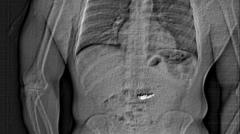A police officer's inebriated decision to liberate detainees for New Year festivities raises concerns about accountability within Zambian law enforcement.
Drunken Officer Releases Suspects to Celebrate New Year in Zambia

Drunken Officer Releases Suspects to Celebrate New Year in Zambia
A bizarre New Year’s Eve incident in Lusaka highlights issues within law enforcement as a drunken officer freed 13 suspects.
A drunken police officer in Zambia sparked a bizarre incident this New Year when he released 13 suspects from custody to celebrate the incoming year. Detective Inspector Titus Phiri, stationed at Leonard Cheelo police station in Lusaka, reportedly took the initiative after seizing cell keys from his junior, Constable Serah Banda.
Eyewitnesses stated that on New Year’s Eve, Phiri “in a state of intoxication” demanded the release of the detainees, who faced serious allegations, including assault, robbery, and burglary. Following his audacious act of unlocking both male and female cells, he instructed the prisoners to leave, claiming they were free to welcome the New Year. Out of 15 detained individuals, 13 escaped in the astonishing turn of events.
The incident prompted a swift manhunt for the escapees, who are now on the run. Police spokesperson Rae Hamoonga expressed his dismay regarding the occurrences that unfolded with Phiri not yet responding to the allegations against him.
In light of the incident, former presidential spokesperson Dickson Jere shared thoughts on social media, recalling a similar occurrence in 1997 when High Court Judge Kabazo Chanda released 53 suspects, including dangerous criminals, reinforcing a long-standing sentiment about judicial delays. He remarked on how the current scenario evoked laughter, labeling it “comical” while drawing parallels to the former event.
This unusual incident serves not only as a moment of reflection on the state of law enforcement in Zambia but also raises questions regarding systemic changes needed to prevent future occurrences.


















